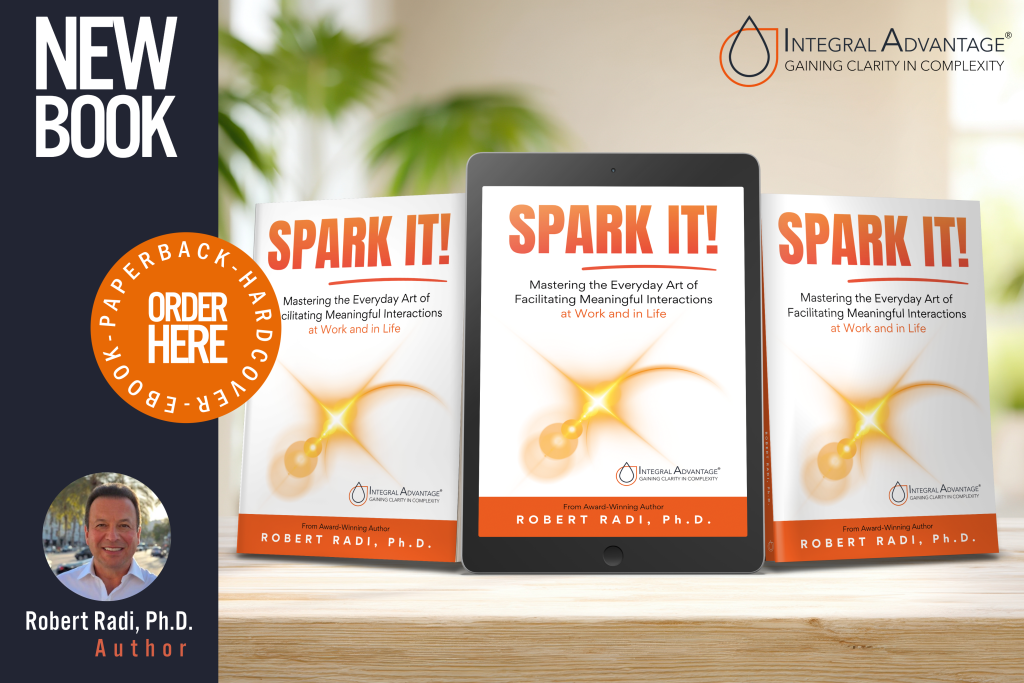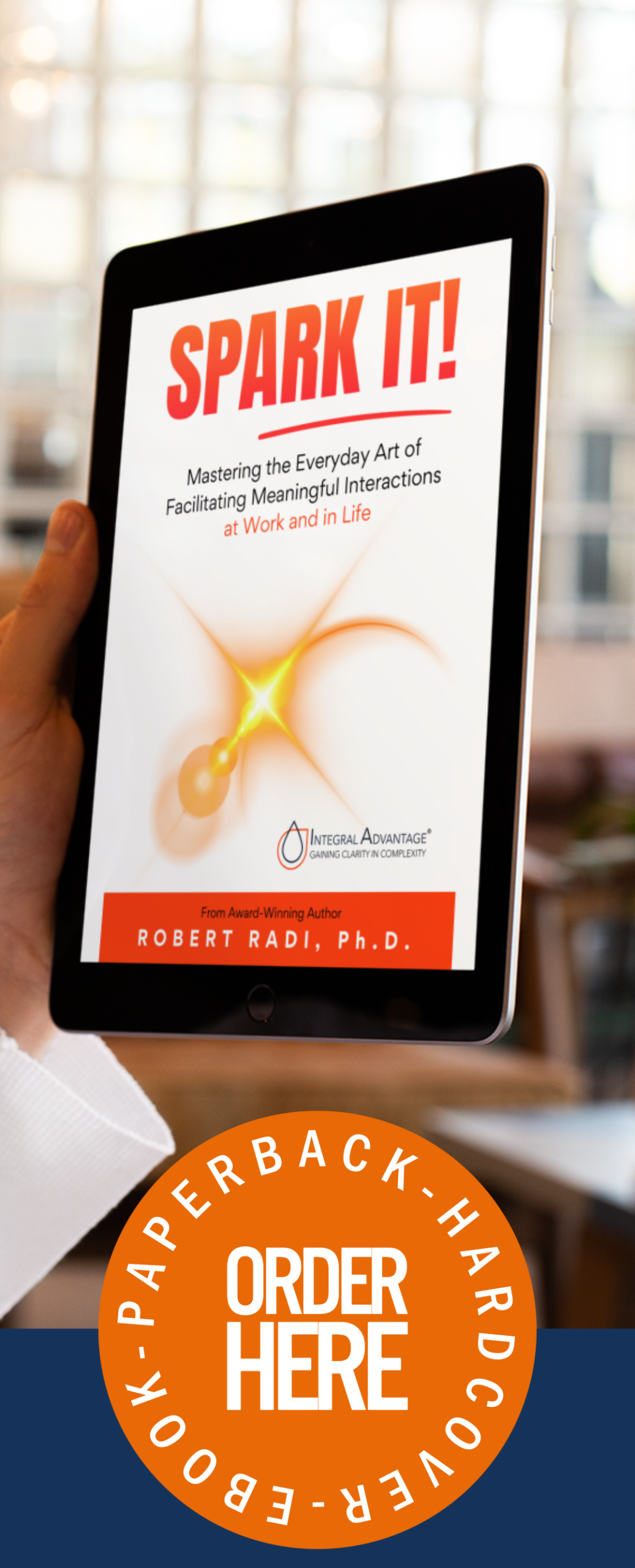
Fall 2025 | By Dr. Robert Radi
Award-winning author and innovation strategist. President and Partner at Integral Advantage®, an IACET-accredited organization committed to cultivating leadership, strategic capacity, and organizational effectiveness across private and public sector entities. You can follow him on LinkedIn.
You Can Listen to the Article
We live in a world drowning in advice. Scroll through your feed, and you’ll find endless lists of morning routines, miracle productivity hacks, and success formulas. Some are offered by experts who’ve walked the walk, but most are oversimplified by erroneous interpretations. Indeed, many are just recycled soundbites wrapped in confidence but out of context.
The underlying message is seductive: If you just follow my steps, you’ll get my results.
And so we try.
We may copy Steve Jobs’s work habits, Oprah’s reading lists, and Warren Buffett’s decision rules. We adopt the same tools, mantras, and even mannerisms. Yet, for most, the results fall flat. Not because they are lazy or incapable, but because they’re applying someone else’s strategy to their own very different set of circumstances.
I love strategy. From my years in consumer product strategy to business and executive development, and personal development, strategy is a companion in finding opportunities in challenging circumstances. And it all starts by clearly identifying what the challenge is, or as strategists call it, conducting a diagnosis.
When we strip strategy of all jargon and platitudes, we can appreciate its role in our personal lives and the opportunities it provides for designing effective strategies tailored to our individual needs, timing, and circumstances.
Application vs. Implementation
Here’s the heart of the problem when we attempt to copy someone else’s strategy.
- Application is copying a play without understanding the game you’re in.
- Implementation is designing the play for your game—your field, your players, your timing, your weather conditions.
Application is a linear and technical concept. Implementation is adaptive and contextual. A military strategist wouldn’t recycle a plan from one battlefield to another without adjusting for terrain, intelligence, changes in the adversary, and resources. Yet in life, that’s exactly what most people do with “advice.”
The Imitation Trap
From an early age, we’re rewarded for getting the “right” answer, not for asking the better question. Schools prize compliance. Social media rewards mimicry. Even in professional life, “best practices” often become unexamined dogma, and often they do devolve into banalities.
The danger? You can end up optimizing your life for someone else’s values, environment, and goals. And in a world where complexity, change, and competing demands are accelerating, that’s a costly mistake.
As the Taoist parable of the Chinese Farmer reminds us, events aren’t simply “good” or “bad” — they’re unfolding. Today’s apparent setback may be tomorrow’s breakthrough. A steadfast, strategic thinker resists rushing to judgment and instead designs responses that adapt over time.
Your Life, Your Timing, Your Circumstances
Designing your own playbook doesn’t mean ignoring what others have done. It means treating their strategies as raw material, not as a finished script or recipe. You take in the insight, strip out what doesn’t fit, and rebuild around the realities of your life.
- Are you at a stage where you need to pause and rebuild?
- Are you navigating a market, a relationship, or a role that’s in flux?
- Are your goals shifting because your values are shifting?
The best playbooks are living documents. They flex with new information. They account for both the predictable and the unpredictable.
The Strategic Life
The truth is that strategy isn’t just for CEOs, generals, or elite athletes. It’s for anyone who wants to move through life with clarity, rather than reacting.
Living strategically means:
- You pause before you proceed.
- You design for context, not convenience.
- You adapt without abandoning your core principles.
- You know when to stay the course and when to pivot.
Or, to put it simply: you become the strategist of your own life.
Complexity Is Not Chaos—It’s Context
Let’s clear something up: complexity doesn’t mean confusion. It means interdependence. It means variables that change in relation to one another. It means systems that can’t be reduced to a single cause or a tidy answer.
Complexity is:
- Navigating a job search while balancing family, mental health, and market volatility.
- Having a conversation with your teenager where their silence means five different things at once.
- Starting something new without knowing whether it will work—but knowing you need to try to learn as you do.
These aren’t chaotic. They’re complex. And strategy isn’t about untangling them into clean lines. It’s about designing actions that respect complexity while still moving forward.
The Five Moves of Strategic Design
Let’s give you a tool to do just that. Here’s a five-move design loop for navigating complex terrain:
- Diagnose the Environment
• What’s happening? What’s really happening?
• Where are the signals, not just the noise? - Frame the Challenge
• What’s the problem—or opportunity—as it appears to me?
• What’s my role in it? What’s not mine to fix? - Test Plausible Paths
• What are my real options?
• Can I scenario-test, even mentally?
• What if I paused, or tried something small before committing big? - Decide and Act
• What’s the most aligned move—not the safest, not the boldest, but the clearest? - Monitor and Adjust
• What’s shifting? What did I learn?
• Am I stubbornly committed to a direction, or responsive to what’s emerging?
These are not one-time steps. They’re a cycle: a loop of clarity, courage, and course correction.
So—What’s in Your Playbook?
Take five minutes. If you had to write your current life strategy as a playbook, what would be on page one? Would it reflect who you are now, or who you were five years ago? Would it help you respond to what’s coming next, or just repeat what worked in the past?
The point isn’t to have the perfect playbook. It’s to have one that’s yours. One that can evolve. One that matches your life, your timing, and your circumstances. Strategic clarity isn’t a luxury. It’s your lifeline in a world that won’t pause for you to catch up. So, pause anyway. And plan your next best move.
Because if you don’t design your own strategies, you’ll end up running someone else’s.
And their game isn’t yours.

:: RELEASED ON AUGUST 21, 2025::
2025 © Integral Advantage®
END OF ARTICLE
We trust you enjoyed this thought-provoking article. Please feel free to share it on your favorite social media platforms.
Subscribe below to be notified of future articles. You can also follow us on Facebook and LinkedIn and subscribe to our YouTube channel.
For more articles like this, click here to visit the article section. Thank you!


